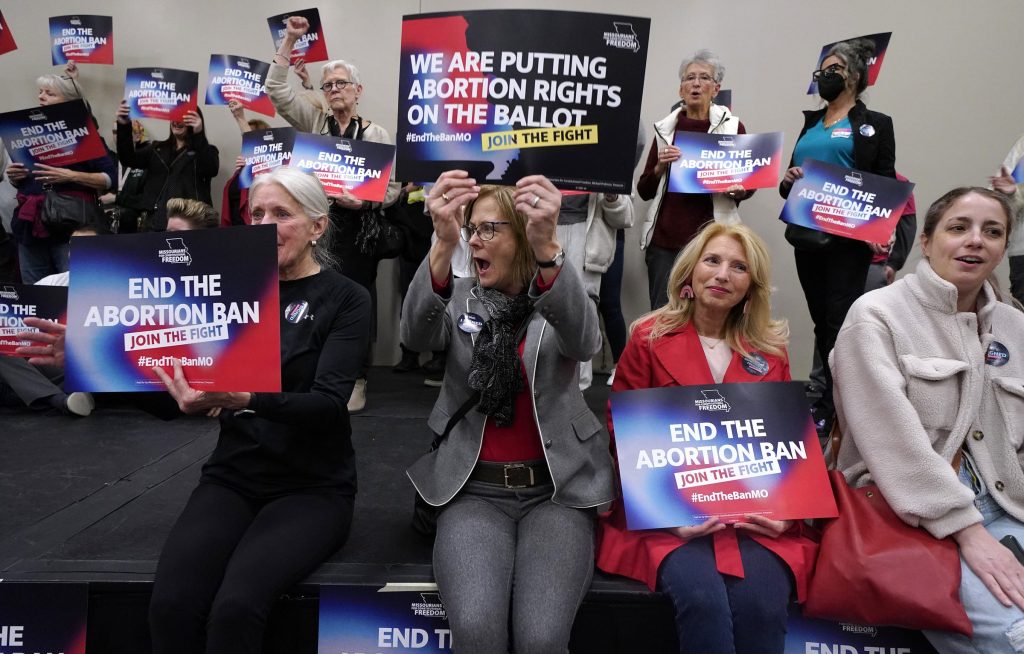
In addition to the presidential contest and races for federal, state, and local offices, many voters will also weigh in on important issues on Nov. 5. These ballot measures in various states will cover topics like increasing the minimum wage, changing how elections are run, allowing betting on sports, and legalizing marijuana. But the issue most likely to drive people to the polls this year is abortion. Voters in 10 states will decide whether or not to create state constitutional protections for at least some abortions.
In Arizona, the measure to eliminate the state’s ban on abortions after 15 weeks might impact the presidential race if it helps increase voter turnout in a key swing state. Arizona also has a critical U.S. Senate race. Other states with important Senate matchups that will see voters decide on protecting abortion access include Maryland, Montana, and Nebraska.
Since the Dobbs decision in 2022, the pro-choice position has won every time voters have had a chance to consider a statewide ballot measure. That’s even happened in red states like Kansas, Kentucky, and Ohio. Such a track record will be tested on Nov. 5 in states like Florida, Missouri, Montana, Nebraska, and South Dakota.
Perhaps because of the results in other states, Catholic bishops are pouring much less money into abortion-related ballot initiatives this year. A recent report by NPR and Religion News Service found that bishops have donated just over $1 million in anti-abortion political campaigning in the 10 states where voters will address the topic in just 12 days (with $0 spent in seven states). That’s compared to almost $3.7 million by a single Kansas diocese in 2022 and $1.7 million spent last year just in Ohio.
That doesn’t mean conservative Christians are giving up. They may not be pouring as much money into the campaigns, but they are finding other ways to urge votes against measures protecting abortion access. Like a coordinated sermon campaign in Missouri on Sunday (Oct. 20).
Missouri was the first state in the nation to implement an abortion ban following the Dobbs decision on June 24, 2022. State lawmakers had three years earlier passed a bill to ban all abortions except in cases of medical emergencies, with a trigger clause noting it would only go into effect if Roe v. Wade was overturned. Minutes after the Dobbs decision, then-Missouri Republican Attorney General Eric Schmitt (now a U.S. senator) issued an official opinion triggering the implementation of the law. Attorneys general in other states followed shortly thereafter to announce the implementation of their own previously passed state bans.
Seven months later, a group of Jewish and Christian clergy members filed a lawsuit challenging Missouri’s abortion ban on church-state grounds. They argued the law violated the Missouri Constitution’s prohibition against religious establishment since the law itself declares that “Almighty God is the author of life” to justify the ban. After a judge ruled in June that the law’s position is “not necessarily a religious belief,” the clergy appealed. While the litigation continues, voters will vote on a constitutional amendment that would nullify the law (though would allow for legislators to pass some limits on abortion access).
Amendment 3 made it on the Missouri ballot after organizers collected more than double the required 171,000 signatures — and after winning multiple legal battles against Republican Secretary of State Jay Ashcroft as he crafted biased summaries of what the constitutional change would mean. After a circuit court judge (and cousin of the late Rush Limbaugh) threw out the ballot initiative last month, the state’s Supreme Court quickly overturned the ruling and ordered Ashcroft to return the measure to the ballot.
Activists cheer at a rally to get signatures to put what is now known as Amendment 3 on the ballot on Feb. 6, 2024, in Kansas City, Missouri. (Ed Zurga/Associated Press)
The limited polling on Amendment 3 suggests it will pass, even as Donald Trump will win the state and Republicans will likely win all statewide races. Those supporting the measure also have a 10-1 fundraising advantage. Missouri is, however, the state where NPR and Religion News Service found Catholic bishops had donated the third-most money this year (but only about $30,000).
Several bishops have, however, put out statements and letters urging parishioners to vote against the constitutional amendment. Numerous churches have put “No on 3” signs on their lawns. And some evangelical and Pentecostal pastors joined an effort on Sunday to preach against the ballot measure. This kind of political advocacy isn’t as well-tracked as campaign donations and TV ads, but it could impact the results. So this issue of A Public Witness listens in on the anti-Amendment 3 sermon effort across the Show-Me State.

The rest of this piece is only available to paid subscribers of the Word&Way e-newsletter A Public Witness. Subscribe today to read this essay and all previous issues, and receive future ones in your inbox

